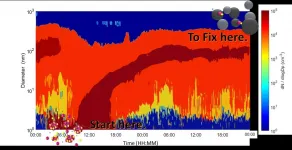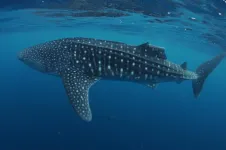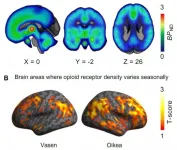CDDEP report highlights tremendous burden from infectious diseases in SEAR countries
COVID-19 has set back progress on containing key infectious diseases, researchers say
2021-02-23
(Press-News.org) Washington, DC / New Delhi, India - Researchers at CDDEP, in collaboration with leading experts in the field, have produced the "Infectious Diseases in the South-East Asia Region" report, which examines cross-boundary challenges in communicable disease control in countries in the South-and South-East Asia region. The report emphasizes infectious diseases related to other sources of disease burden in the region and communicates overall trends in the health and economic burden they impose.
Despite substantial progress in recent years, which has seen reductions in deaths from HIV and malaria and an increase in tuberculosis treatment coverage, the South-East Asia region continues to bear a significant proportion of the communicable disease burden worldwide. South Asia has the third largest HIV epidemic globally and the highest TB burden, accounting for more than a quarter of the global burden. The second highest incidence of malaria, amongst all WHO regions, occurs in the southeast Asia region, and India bears the third-highest proportion of malaria cases globally.
Malnutrition makes the South-East Asian population particularly vulnerable to neglected tropical diseases (NTDs) alongside emerging infectious diseases from arbovirus infections, dengue, chikungunya, Japanese encephalitis, and the continuing concern of a pandemic influenza outbreak. Furthermore, drug-resistant infections cause 58,000 deaths in newborns every year, in India alone, and continue to threaten the effectiveness of life-saving antibiotics across the region.
Covid-19 has disrupted the control of other infectious diseases in myriad ways, hindering routine vaccination programs, impeding the distribution of bed nets against malaria, and reducing TB services, among others. With the rollout of vaccines against the novel coronavirus and the ebbing of Covid-19, it will be essential to devote our full collective attention to the control of infectious diseases that have long plagued this region and continue to constitute a significant proportion of the avertable disease burden.
"As the battle against the pandemic continues, so too must our progress against communicable diseases, for which WHO will continue to pull out all stops in support of our Member States, partners, and the Region's near 2 billion people.," said Dr. Poonam Khetrapal Singh, Regional Director, WHO SEARO
INFORMATION:
Infectious Diseases in the South-East Asia Region is published on CDDEP's website and is available for download here:
https://cddep.org/wp-content/uploads/2021/02/Infectious-diseases-in-the-south-east-asia-region.pdf
The report will be launched at a global webinar featuring Dr. Soumya Swaminathan, Dr. Poonam Khetrapal Singh, Dr. Nim Pathy, Dr. Anita Kotwani, Dr. Subhash Hira, and Dr. Gagandeep Kang.
About the Center for Disease Dynamics, Economics & Policy Inc.
The Center for Disease Dynamics, Economics & Policy Inc. (CDDEP) produces independent, multidisciplinary research to advance the health and wellbeing of human populations around the world. CDDEP projects are global in scope, spanning Africa, Asia, and North America, and include scientific studies and policy engagement. The CDDEP team is experienced in addressing country-specific and regional issues, as well as global challenges, such as antibiotic resistance and pandemic influenza. CDDEP research is notable for innovative approaches to design and analysis, which are shared widely through publications, presentations, and web-based programs. CDDEP has offices in Washington, D.C., and New Delhi and relies on a distinguished team of scientists, public health experts, and economists.
ELSE PRESS RELEASES FROM THIS DATE:
2021-02-23
Researchers of the University of Helsinki have resolved for the first time, how the ultrafine particles of atmosphere effect on the climate and health.
Atmospheric air pollution kills more than 10,000 people every day. The biggest threat to human health has been assumed to be the mass accumulation of atmospheric particles with diameter smaller 2.5 μm: the higher the mass and loss of visibility, the bigger the threat.
The researchers of the Institute for Atmospheric and Earth System Research (INAR) at the University of Helsinki together with collaborators in China discovered that if we want to solve the accumulation of the biggest particles, we need to start with the smallest.
Until recent ...
2021-02-23
A new study has for the first time explored the rate at which the world's largest fish, the endangered whale shark, can recover from its injuries. The findings reveal that lacerations and abrasions, increasingly caused through collisions with boats, can heal in a matter of weeks and researchers found evidence of partially removed dorsal fins re-growing.
This work, published in the journal Conservation Physiology, comes at a critical time for these large sharks, that can reach lengths of up to 18 metres. Other recent studies have shown that as their popularity within the wildlife tourism sector increases, so do interactions with humans and boat traffic. As a result, these ...
2021-02-23
Huntington's disease is caused by a mutation in the Huntingtin gene (HTT), which appears in adults and features motor, cognitive and psychiatric alterations. The origin of this disease has been associated with the anomalous functioning of the mutated protein: mHTT, but recent data showed the involvement of other molecular mechanisms.
A new study conducted by the University of Barcelona has identified a type of ribonucleic acid (RNA) as a potential therapeutic target for the treatment of the disease. These are the small RNA, or sRNAs, molecules that do not code proteins but have important functions in the regulation of gene expression. According to the study, sRNAs would ...
2021-02-23
X-ray scans revolutionised medical treatments by allowing us to see inside humans without surgery. Similarly, terahertz spectroscopy penetrates graphene films allowing scientists to make detailed maps of their electrical quality, without damaging or contaminating the material. The Graphene Flagship brought together researchers from academia and industry to develop and mature this analytical technique, and now a novel measurement tool for graphene characterisation is ready.
The effort was possible thanks to the collaborative environment enabled by the Graphene Flagship European consortium, with participation by scientists from Graphene Flagship partners DTU, Denmark, IIT, Italy, Aalto University, Finland, AIXTRON, UK, imec, Belgium, Graphenea, Spain, Warsaw ...
2021-02-23
Seasons have an impact on our emotions and social life. Negative emotions are more subdued in the summer, whereas seasonal affective disorder rates peak during the darker winter months. Opioids regulate both mood and sociability in the brain.
In the study conducted at the Turku PET Centre, Finland, researchers compared how the length of daylight hours affected the opioid receptors in humans and rats.
"In the study, we observed that the number of opioid receptors was dependent on the time of the year the brain was imaged. The changes were most prominent in the brain regions that control emotions and sociability. The changes in the opioid receptors caused by the variation in the amount of daylight could be an important factor in seasonal affective disorder," ...
2021-02-23
WASHINGTON -- Researchers have developed a new sensor that could allow practical and low-cost detection of low concentrations of methane gas. Measuring methane emissions and leaks is important to a variety of industries because the gas contributes to global warming and air pollution.
"Agricultural and waste industries emit significant amounts of methane," said Mark Zondlo, leader of the Princeton University research team that developed the sensor. "Detecting methane leaks is also critical to the oil and gas industry for both environmental and economic reasons because natural gas is mainly composed of methane."
In ...
2021-02-23
A new study suggests that a hormone known to prevent weight gain and normalize metabolism can also help maintain healthy muscles in mice. The findings present new possibilities for treating muscle-wasting conditions associated with age, obesity or cancer, according to scientists from the University of Southern California Leonard Davis School of Gerontology.
The research, published this month in the American Journal of Physiology-Endocrinology and Metabolism, addresses the related problems of age and obesity-induced muscle loss, conditions which can lead to increased risk of falls, diabetes and other negative health impacts. It also adds to a growing number of findings describing beneficial effects of MOTS-c, ...
2021-02-23
Scientists at the University of Adelaide have challenged the common assumption that genetic diversity of a species is a key indicator of extinction risk.
Published in the journal PNAS, the scientists demonstrate that there is no simple relationship between genetic diversity and species survival. But, Dr Joao Teixeira and Dr Christian Huber from the University of Adelaide's School of Biological Sciences conclude, the focus shouldn't be on genetic diversity anyway, it should be on habitat protection.
"Nature is being destroyed by humans at a rate never seen before," says computational biologist Dr Huber. "We burn ...
2021-02-23
COLUMBUS, Ohio - Scientists from around the world have published more than 87,000 papers about coronavirus between the start of the COVID-19 pandemic and October 2020, a new analysis shows.
Even given the importance of the pandemic, researchers were surprised by the huge number of studies and other papers that scientists produced on the subject in such a short time.
"It is an astonishing number of publications - it may be unprecedented in the history of science," said Caroline Wagner, co-author of the study and associate professor in the John Glenn College of Public Affairs at The Ohio State University.
"Nearly all of the scientific community around the world turned its attention to this one issue."
Wagner conducted the analysis with Xiaojing Cai from Zhejiang University in ...
2021-02-23
A team of researchers designed and manufactured a new sodium-ion conductor for solid-state sodium-ion batteries that is stable when incorporated into higher-voltage oxide cathodes. This new solid electrolyte could dramatically improve the efficiency and lifespan of this class of batteries. A proof of concept battery built with the new material lasted over 1000 cycles while retaining 89.3% of its capacity--a performance unmatched by other solid-state sodium batteries to date.
Researchers detail their findings in the Feb. 23, 2021 issue of Nature Communications.
Solid state batteries hold the promise of safer, cheaper, and longer lasting batteries. Sodium-ion chemistries are particularly promising because sodium is low-cost and abundant, as opposed ...
LAST 30 PRESS RELEASES:
[Press-News.org] CDDEP report highlights tremendous burden from infectious diseases in SEAR countries
COVID-19 has set back progress on containing key infectious diseases, researchers say






